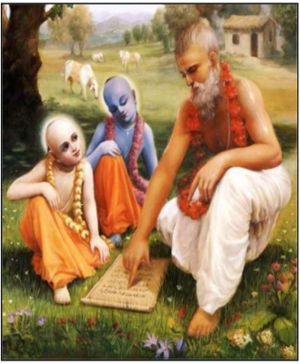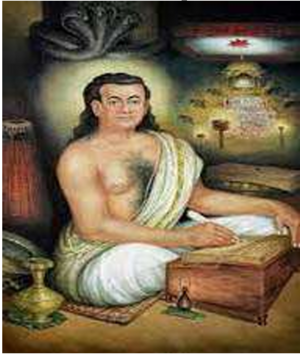Talk:Guru Sevā (Serving One’s Guru)
By Vishal Agarwal
A True Guru teaches us the path to reach Bhagavan. They can be living, or ancient teachers. The Upanishads exhort us to treat our Guru as a Deity-
Be one for who the Guru is a Deva. Yajurveda, Taittirīya Upanishad 1.11
Another Upanishad concludes with the declaration that the truths of Vedanta are revealed to one who reveres his Guru as much as the Lord-
These beneficial principles that have been described earlier are revealed to that Mahātmā who has devotion (Bhakti) to the Deva and as much devotion to the Guru. Yajurveda, Shvetāshvatara Upanishad 6.23
In the path of Bhakti, particularly in Nirguṇī Sant traditions that do not favor Mūrti Pūjā, the importance and role of a true Guru is heavily emphasized. Hindu texts state that our parents merely give us the physical birth, a Guru gives us the spiritual birth. In fact, the Guru who takes us to the Lord is a living embodiment of Bhagavan in front of us. It is incumbent upon us to honor living Gurus by offering them lodging, boarding, gifts, money, respect, and honor past Gurus by worshipping their images. The best honor to Guru is studying their teachings and practicing them.
The first Guru of all humanity is the Lord himself and worshipping Bhagavān as one’s Guru, or worshipping Bhagavān through one’s Guru is covered in the Guru Bhāva Bhakti later. The respect that the Hindu tradition (as well as the allied Sikh, Buddhist and Jain traditions) asks us to give to our Guru is quite unknown in the western traditions where teachers are respected, but not to that extent.
Hindu scriptures recommend that we revere our Guru-s:
The guru must be considered to be like the Supreme Lord Himself, because he bestows the light of transcendental knowledge upon his disciples. Consequently, for one who maintains the material conception that the guru is an ordinary human being, everything is frustrated. His attempts to make progress in spiritual life - his Vedic studies and scriptural knowledge, his penances and austerities, and his worship of the Deva - are all as useless as the bathing of an elephant who rolls in the mud after his bath. Bhagavata Purāņa 11.20.17
In Nirguṇī traditions like Kabirpanth and Sikhism, worship of one’s Guru as a visible embodiment of the Divine is particularly important though reverence for great sants, bhaktas, ācharyas is a common practice in all traditions of Hindus. Temples dedicated to specific Sants etc. exist in thousands and the household altar of a Hindu will frequently have images of their Gurus or other Sants. The presence of these images inspires the common Hindu worshippers to become like these ideals, to offer one’s gratitude towards them for showing us the way to Moksha or even request them to intercede with the Divine on their behalf.
Swami Vivekananda explains the significance of Guru-Bhakti in the following words: “Find the teacher, serve him as a child, open your heart to his influence; see in him God manifested. Our attention should be fixed on the teacher as the highest manifestation of God, and as the power of attention concentrates there, the picture of the teacher as man will melt away, the frame will vanish, and the real God will be left there.[1]”
The importance of Guru in Bhakti Yog, and in the Hindu tradition in general has been explained by a modern teacher-
“Devotion to the Guru is another popular form of Bhakti Yog. It doesn’t require you to be so lucky that you happen to be living at a time and place when an avatar like Rama or Krishna are physically present. The guru is for all practical purposes your equivalent of Rama. And you don’t have to use your imagination to visualize a relationship with God. If you honor your guru as a divine embodiment, then God or the Goddess is standing in front of you in the flesh, walking with you and giving personal guidance. Obviously, care must be taken to ensure the guru truly is self-realized and is able to actually handle such powerful projections. My personal observation is that the occasional guru lets the adulation go to his or her head. But most of them take the job of spiritual mentorship very seriously. They are ultimately servants of the Supreme Guru whose wisdom manifests through them when they align themselves with their Highest Self. Being someone’s Guru is a huge responsibility with major karmic implications. The vital importance of the guru lineage is another safety valve built into the Hindu system. If you’re a guru, you have your own guru and other masters of your lineage to answer to if you mess up. The disciple answers to the guru, but the guru answers to the lineage.[2]”
Story: Mādhavadeva takes away the sin of his Guru Shankaradeva
Kalindi, the wife of Sant Shankaradeva, always complained that all he cared about was his disciples and his social and spiritual activities. He had no time for his own family members, she remarked.
One day, Shankaradeva returned from his morning walk and sat outside his house, with a forlorn look. Kalindi asked as to why he had not gone in to take his bath as he was accustomed to, after his walk. Shankaradeva responded that he had inadvertently committed a great sin that morning. While walking, he had gently pushed away a calf out of his way. But the creature unexpectedly collapsed and died. Therefore, he was tainted by bad karm, and must perform an atonement. Kalindi agreed, and told him not to take a bath or even enter the house till he atoned for his sin. He must feed several devotees of Krishna, take their blessings and only then come inside. Soon thereafter, Madhavadeva, the principal disciple of Shankaradeva arrived. When he saw his Guru sitting outside the house with a pained look on his face, he asked for the reason. Upon learning what had happened, he immediately requested his Guru to go in and take his bath and resume his activities, saying that, “On your behalf, I will take all your sin on me. I will perform all the atonements for you and will even go to hell in your place if I have to.” When Kalindi heard Madhavadeva’s words, she realized how much disciples of Shankaradeva loved him from their heart.


